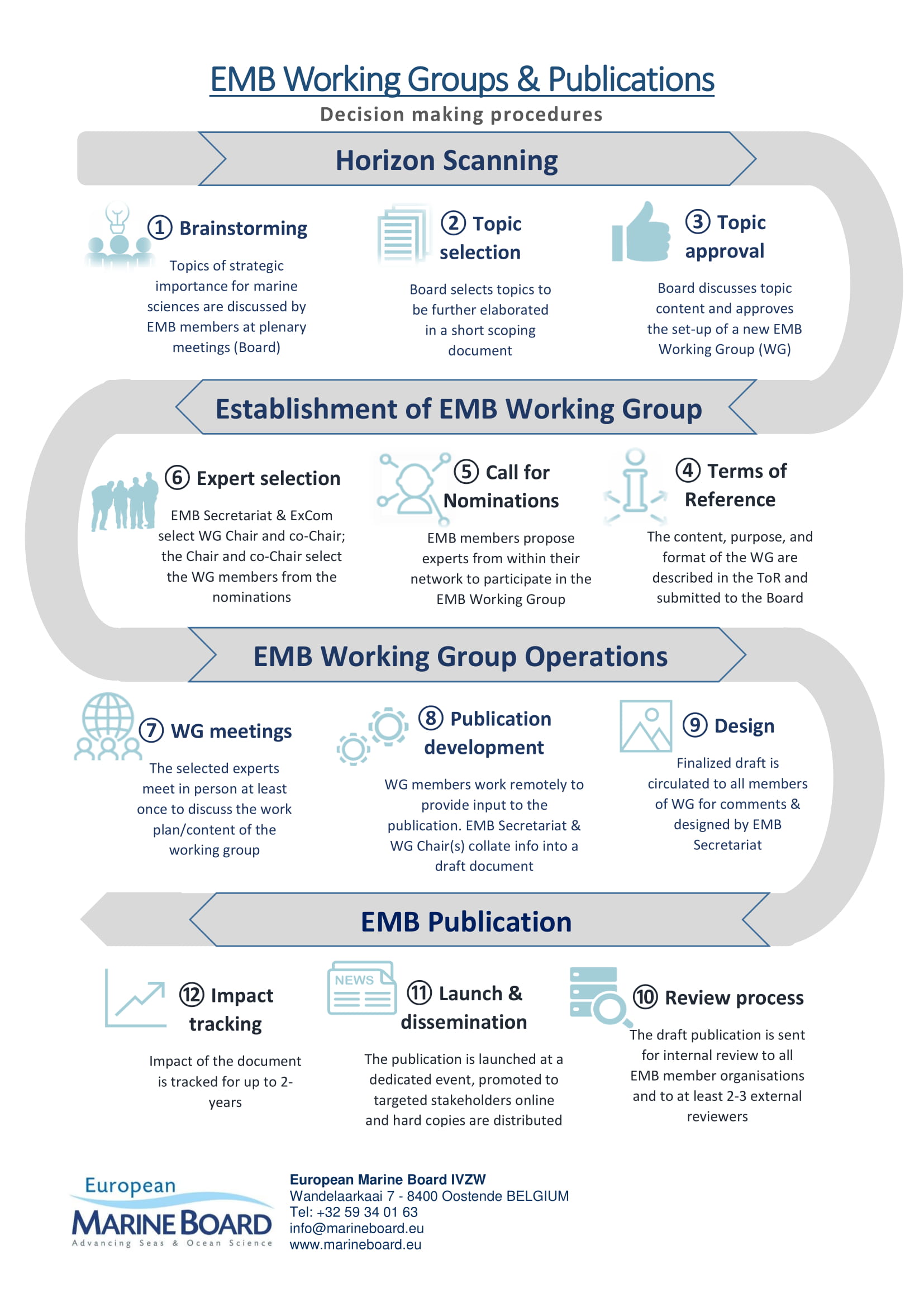How we select topics:
The main purpose of the European Marine Board is to provide a platform for its members to discuss, collaborate, and increase awareness and understanding on a wide range of marine science topics. At our Plenary meetings representatives from each member organization (which all together form “the Board”) discuss topics, potential publications and events, and share ideas and information on trending and emerging marine science issues, novelties and new discoveries. These topics are mainly addressed via publications, which are typically authored by a dedicated working group of experts from our member organisations.
The flowchart explains how new topics are selected and developed into publications authored by European and international experts. The process (from topic selection to publication launch) spans several months to multiple years, depending on the scope of the publication. This process is followed for each new publication. For shorter ad-hoc publications, experts might be nominated by the board instead of opening a full call for nominations.
How we establish Working Groups:
Once the topic is selected, the specific aim and scope of the publication is described in a Terms of Reference. When the Terms of Reference are approved by the Board, they are made publicly available on the EMB Website, and a call for expert nominations is launched to the EMB Board members by the EMB Secretariat. All EMB members can submit nominations from within their own networks or beyond. The EMB Secretariat and ExCom review all nominations, and select the Working Group Chair and co-Chair (if required) based on a set of criteria including scientific expertise, communication and project management skills, engagement level and diversity criteria. The Chair and co-Chair together with input from the Secretariat and ExCom then select the other Working Group members. The Working Group members meet on several occasions (in-person and remotely) to develop the content of the publication.
How we guarantee quality in our publications:
The final draft of all EMB publications are submitted for extensive peer review, both internally by all EMB members, and externally by selected European and international experts. The documents are revised by Working Group members and edited by the EMB Secretariat for readability. On certain occasions, external copy writers are asked to review the publication.
EMB is also committed to supporting and enabling gender and diversity equality within its organisation and through it activities. You can find out more about this here.
How we guarantee quality in our events:
A similar process is set up for preparation of large EMB Conferences and events (e.g. the EurOCEAN Conferences and the EMB Open Fora). Here the Board decides on the conference topic and programme, propose speakers etc. and the EMB Secretariat then organises the events, sometimes with partners (where relevant).
The European Marine Board highly values diversity in the selection of experts throughout all its Working Groups, conferences and events, and places high importance on balance in representation by region, gender, age and all diversity criteria.
How we review our internal operations:
In order to keep a critical view on the way we function, the European Marine Board conducts an internal and external review process approximately every 6-7 years. The purpose of this review is to assess how well EMB is performing according to its mission and to guide the future vision and strategic direction for the work of the Board. The review consists of both an internal and external review. The internal review includes a self-evaluation, based on an anonymous questionnaire gathering member input, and a factual report on outcomes, impacts and realizations developed by the EMB Secretariat in consultation with ExCom. The external review is undertaken by an expert review panel including authoritative experts from a diverse range of European and International marine science, Intergovernmental and policy backgrounds. This external review can be as extensive as required by the Board.
The last full review took place in January - June 2019 and focussed on the EMB organisation structure and governance; the functioning and the role of EMB in the wider EU marine landscape; the EMB activities, outputs and their impact and a financial review, and formulated some recommendations for further improvement. In this iteration of External Review, the Board agreed that a light-touch review was sufficient. The external review panel consisted of:
Wendy Watson-Wright (Director of the Oceans Frontiers Institute, Canada and former IOC-UNESCO chair),
Mark Dickey-Collas (Chair of the Advisory Committee of the International Council for the Exploration of the Sea (ICES)),
Jacky Wood (Head of Business Partnerships at UKRI Natural Environment and former Executive Director of JPI Oceans),
Ned Dwyer (Freelance Earth Observation Consultant and Project Manager and former Director of EurOcean), and
Willie Wilson (Director of the Marine Biological Association of the UK).
The findings and recommendations from the external review are compiled in an external review report, and a response to the review provided by the Board, including an action list which will address the recommendations.
How we guarantee our independence:
The European Marine Board is an independent organisation and funded by its members. The topics and publications we highlight, and the events that we organize are defined and financed by our members. We provide an interface between science and policy and engage with a wide range of different stakeholders, including the European Commission, European Parliament, different European Parliamentary Intergroups and other stakeholders in the marine science-policy field. We strongly believe in a two-way communication, and we note that it is necessary to receive input from policymakers to provide the best available scientific advice at the right time. Therefore, the European Commission and the IOC are granted observers to EMB Board meetings to stimulate communication the Board and policy makers. The European Marine Board participates in externally funded projects and tenders, but only when these contribute to our Mission and future strategic objectives.